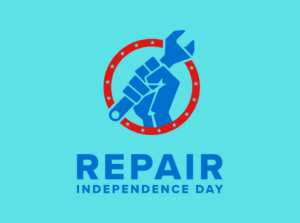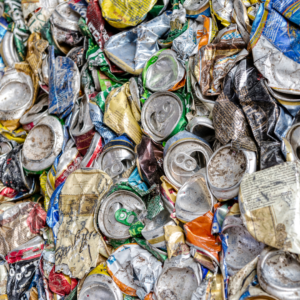One thing Eureka visitors always ask is: what do we do with plastic bottle caps on PET water and soda bottles? As many people know, the bottles themselves are made from #1 PET plastic, but the caps are typically made from colored HDPE. Clear PET will enter the circular economy and be recycled back into new beverage containers. But colored HDPE plastic is different, it will most likely become some sort of durable good like decking material or irrigation tubes. So in a single water bottle, you have two types of plastics that are utilized in two very different ways.
Why Keep the Caps on the Bottles?
The main reason is for sortation. Everything in a materials recovery facility (MRF) like Eureka’s is sorted by size, weight, and shape. When a bottle cap is thrown into a recycling bin on its own, it is too small and too light for our equipment to handle it. A loose cap could float into the lightweight paper, fall into the small pieces of glass, or end up with the residual at the end of our line. In all three cases, that bottle cap will eventually end up in an incinerator or a landfill.
But, when you empty your bottle and put the cap back on, it stays with the larger PET bottle and gets sorted and baled to be shipped out to a processor who will ready the materials for manufacturing into new goods.
How Do They Separate the Two Plastics?
It seems like it would be difficult, but it’s actually quite simple. Bottles and caps are ground into flakes, washed vigorously, and then separated with a water bath float/sink process. PET sinks, while HDPE floats. Pretty ingenious!
So, now you know, that leaving caps on PET bottles is not just a matter of convenience; it’s a strategic move toward a more sustainable and accessible recycling future. In order to ensure that ALL of your beverage bottle is recycled, Eureka Recycling encourages you to cap your bottles and help us keep all of those small colorful pieces of plastic out of our waste stream.
Share this Story!

Repair Independence
It is Time to Assert Your Right to Repair Your Own Stuff! On July 1st, the Digital Fair Repair Act

Minnesota Passes Extended Producer Responsibility for Packaging
Minnesota just became the fifth state to pass Extended Producer Responsibility (EPR) for Packaging. The Packaging Waste & Cost Reduction

Strengthening the Economy and Environment Through Aluminum Recycling
The Importance of Aluminum Recycling Although aluminum is the most abundant element in the earth’s crust and the third most

Testimony: Packaging Waste & Cost Reduction Act (SF3561)
“I cannot stress enough that we cannot recycle and compost our way out of the packaging crisis. We need a
